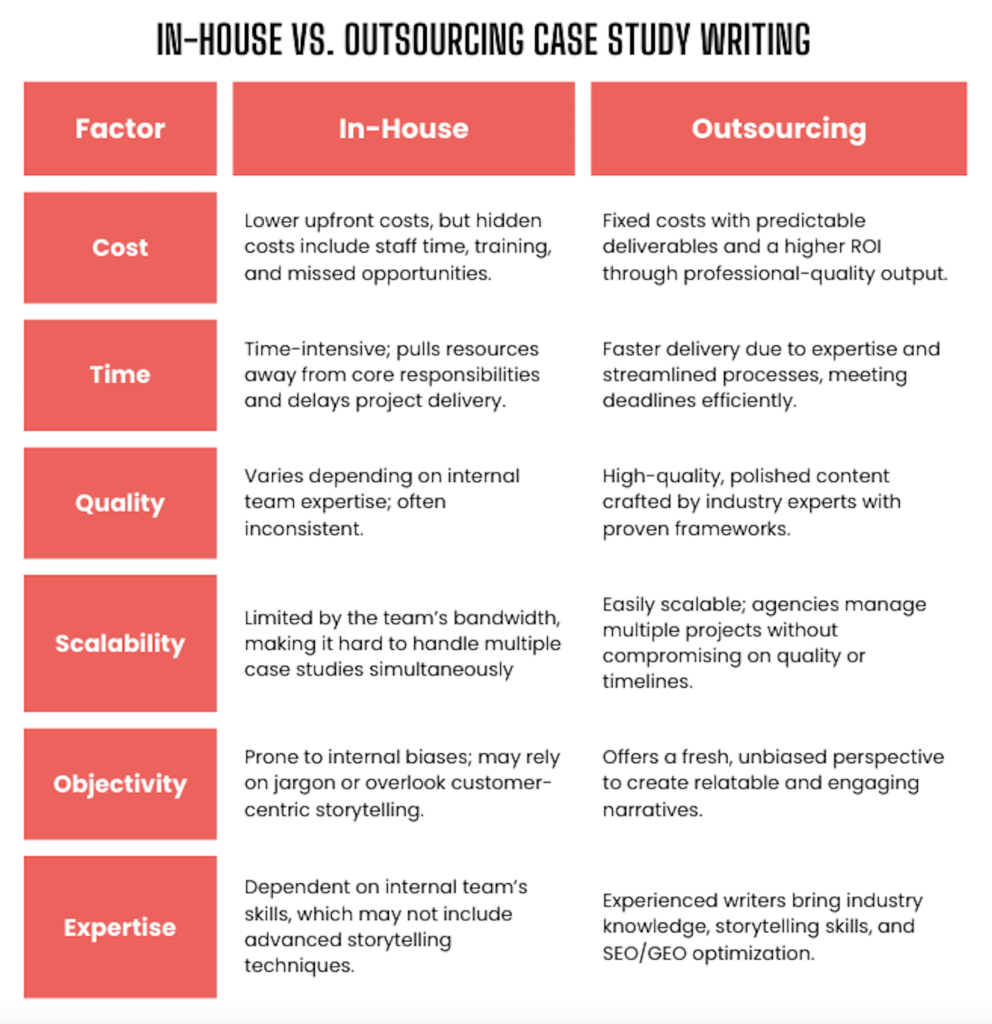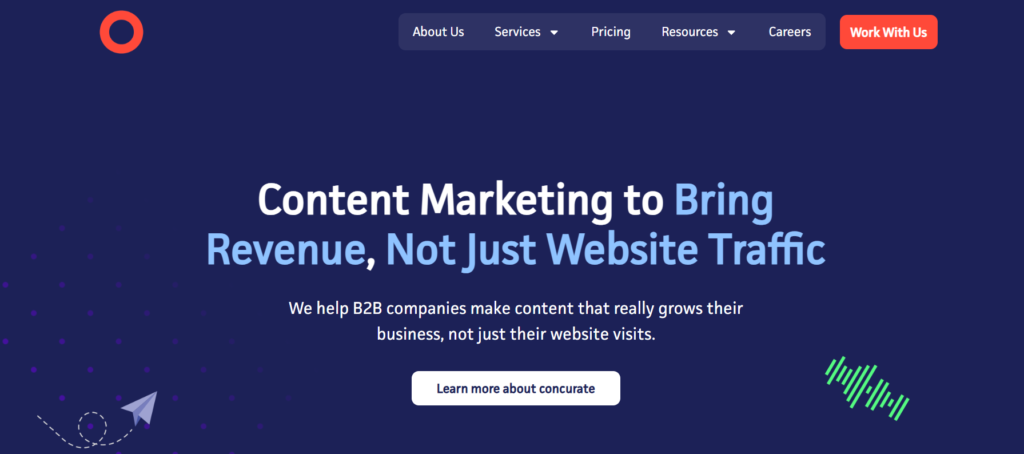Does this scenario sound familiar? Your marketing team is brilliant at crafting campaigns, designing creatives, and building your brand. But when it comes to writing case studies that actually convert, something’s not clicking.
Perhaps your case studies are too focused on features and not enough on storytelling. Maybe they lack the polished structure, compelling data, or emotional appeal needed to connect with prospects. Or, it could be that juggling priorities has left little room for crafting case studies that truly stand out.
These challenges aren’t uncommon, even for large, well-resourced marketing teams. That’s why many B2B SaaS companies turn to experts—agencies with the skills and perspective to transform raw customer wins into high-impact stories that drive results.
In this article, we’ll explore when outsourcing case study writing makes sense, when it doesn’t, and how to make the best decision for your business.
3 Scenarios When You Should Not Outsource Case Study Writing
At Concurate, we take pride in crafting impactful business case studies. But let me play the devil’s advocate and share a few scenarios where outsourcing case study writing to agencies or freelancers might not be the right choice.
#1. When You Need It Done Yesterday
Sometimes, time isn’t on your side. You’ve just landed a big client win, and you need a case study written, polished, and published—fast.
However, outsourcing case study writing often involves vetting multiple writers or agencies, onboarding them, conducting interviews, navigating back-and-forth revisions, and dealing with deadlines that don’t always align with your immediate needs. There’s also the risk that the final output might not meet your expectations.

Source – Giphy/ Pudgy Penguins
In these scenarios, handling the case study internally might be the faster route. If you have skilled in-house writers or marketers, taking it on internally often makes more sense. Your team already knows the details, has access to client insights, and can jump straight into crafting the story without delays, all while retaining your brand’s unique voice.
If speed is critical, in-house writing gives you the control and agility to meet tight timelines without sacrificing quality. For writing a stellar case study, these best practices will help: 8 B2B SaaS case study best practices.
#2. When You are on a Tight Budget
The truth is outsourcing case studies can be expensive.

Source – Pexels
While AI tools and freelance writers on platforms like Fiverr and Upwork offer cost-effective options for writing case studies, there’s no guarantee of the quality needed to impress prospects and generate leads.
Crafting high-quality case studies isn’t just writing—it’s a specialized skill and a time investment. It means diving into client interviews, uncovering how your B2B SaaS solution drives real results, understanding industry nuances, and delivering the kind of polish that no ‘three-day turnaround’ writer can replicate.
If you’re willing to take the risk, relying on freelancers can be a viable option. However, it’s important to weigh the trade-offs between cost, quality, and the long-term impact of well-crafted case studies on your B2B business growth.
#3. You Want Full Creative Control
If you’re someone who finds it difficult to relinquish creative control, outsourcing might not be the best choice. Creating the case study in-house allows you to retain full authority over the narrative, tone, and presentation.
Additionally, handling it internally can save you time, eliminate multiple rounds of edits, and even avoid complete rewrites—issues that often arise when the final output doesn’t align with your vision.
Want to nail the case study? Avoid these common mistakes people make when writing professional case studies: 7 Mistakes to avoid when writing a B2B SaaS case study.
Now that we’ve explored the scenarios where outsourcing case studies might not be the best fit—and shared tips to help you craft stellar case studies in-house—let’s dive into the flip side.
6 Scenarios When You Should Outsource Case Study Writing
Case studies are one of the major factors influencing purchase decisions. In fact, 78% of B2B marketers leverage case studies and customer stories to showcase real-world value, helping to move prospects further down the conversion funnel.
Having impactful, conversion-driven case studies isn’t just helpful—it’s essential for your B2B SaaS business. But creating them requires time, skill, and expertise. That’s where outsourcing can become your best strategy.
Here are six scenarios when outsourcing case study writing makes sense for your business.
#1. When You Want to Ditch the Heavy Lifting
Writing professional case studies is no walk in the park. It’s a meticulous process that starts with interviewing your customers, gathering data, and digging into the results. Then comes the hard part—turning all that information into a narrative so engaging that your leads don’t just skim it—they stop, read, and act.
And the stakes are high. A case study isn’t just another piece of content—it’s a conversion tool. To write one that delivers results, you need more than data; you need storytelling expertise.
This is where professional case study writers shine. They know how to weave dry data into compelling stories, using proven frameworks and industry insights to craft case studies that work.
By outsourcing, you can hand off the time-consuming work and get back to what you do best.
#2. When You Don’t Want to Drag a Single Case Study for Weeks
It’s a common story: when marketing teams and in-house writers take on case study writing projects, they often drag on for weeks. Busy schedules, shifting priorities, and missed deadlines are just the beginning.
Case studies aren’t easy to write, and your team may keep putting them off in favor of more immediate tasks. By the time the case study is finally ready, the opportunity to leverage it might have already passed.

Source – Giphy/Titanic
Outsourcing case study writing frees up your internal teams to focus on work that requires their direct involvement, like events, tradeshows, webinars, or podcasts, where their presence is essential.
When you outsource to content marketing agencies like Concurate, you get high-quality case studies delivered on time—ensuring you can capitalize on the perfect moment to make an impact.
#3. When You’re Looking for Cost-Effectiveness in the Long Run
Let’s put things into perspective. You hire your marketing team for specific functions that can only be done internally—for reasons of confidentiality and efficiency.
In the US, you may be paying a marketing team member on average, $45,000 to $130,000 per year. Now, when deciding who should handle case study writing in-house, you’re unlikely to assign it to someone with less than a year of experience. Why? They may lack the industry knowledge and storytelling skills required to do the case study justice.
Instead, the task often falls to someone at a manager level, who might either collaborate with junior team members or spend a significant amount of time developing the case study themselves. According to Salary.com, content marketing managers get paid anywhere between $112,000 to $140,000 per year. If a significant part of their time is spent on case studies, that’s far from an optimal use of their expertise.
That time could be better spent on tasks that require their presence like trade shows, events, webinars, podcasts, et cetera—opportunities lost when writing case studies becomes the priority. By tying up your senior team members in case study writing, you’re not just losing time—you’re missing valuable growth opportunities.

Source – Giphy/Hey Arnold
Outsourcing frees up your team to focus on what they do best while leaving the heavy lifting to professionals. In the long run, outsourcing isn’t just a time-saver; it’s a cost-effective strategy that delivers top-tier case studies designed to drive results without compromising your team’s productivity.
#4. When You Don’t Have Client Approval to Write the Case Study
Sometimes, you don’t have the green light from a client to transform their win into a success story. The results might be groundbreaking—proving the power of your product or service—but without approval, your hands are tied.
Or perhaps the client’s approval process is dragging on, and you need to publish the case study now to capture interest and move prospects closer to conversion.
In such cases, anonymizing the case study is often the best solution. This approach allows you to showcase your product’s strengths while respecting client confidentiality. However, crafting impactful anonymous case studies requires expert writers who have already traversed that path.
In that case, outsourcing is your best bet. At Concurate, we’ve helped numerous clients craft anonymous case studies that deliver results without compromising privacy.
Take one of our clients as an example—they sell a B2G SaaS product, but due to privacy restrictions, their users couldn’t participate in case studies. We navigated this by crafting anonymous case studies that still told their success stories. [Check out the samples here.]
#5. When You Need Multiple Case Studies Without Overloading Your Team
For any growing B2B SaaS business, case studies aren’t just nice-to-haves—they’re powerful tools for driving leads and building trust. If you have multiple clients ready to share their success stories and approvals in hand, the last thing you want is delays. Getting those stories published on your blog or leveraging them as marketing material is essential to maximizing their impact.
In such cases, outsourcing to content marketing agencies that specialize in case study writing makes perfect sense—for both you and your business.
Agencies don’t just take the work off your plate—they bring expertise. Professional case study writers know how to craft customer-focused narratives that cut through the jargon, avoid internal biases, and truly connect with your prospects. Plus, they deliver quality content on time, adapting to your growing marketing needs without stretching your internal resources thin.
#6. When You’re Looking for Case Studies That Also Rank on Search Engines
When writing case studies, in-house teams often overlook SEO, focusing solely on using them as marketing and sales tools to move prospects further down the conversion funnel.
However, the right content marketing agency doesn’t just write case studies—they craft them with SEO in mind. By optimizing for relevant keywords, your case studies can rank well on search engines like Google, attracting organic traffic, boosting visibility, and generating leads.
For instance, agencies like Concurate integrate high-ranking keywords naturally into your content. We also optimize case studies for readability, engagement, and search performance.

Source – Giphy/SEOwl
So your case studies don’t just convert—they help you get found.
Why Concurate is the Best Option for Outsourcing Your Case Study Writing?
At Concurate, we understand that a well-crafted case study does more than showcase your client’s success—it drives real business results. That’s why B2B SaaS companies trust us to create case studies that resonate with prospects, rank on search engines, and convert leads into customers.
Here’s why Concurate is your go-to partner for case study writing:
- Tailored to Your Brand: We know every business has unique goals and challenges. That’s why we align your case studies with your brand voice, audience expectations, and marketing objectives—ensuring content that feels authentic and impactful.
- Proven SEO & GEO Expertise: Beyond traditional SEO, we optimize case studies for Generative Engine Optimization (GEO) to ensure your content is discoverable across platforms like ChatGPT, Bing Chat, and more. This ensures your stories not only rank on search engines but also stand out in the next era of search.
- Customer-Centric Narratives: We craft stories that skip the jargon and internal biases, presenting your brand’s value in a way that resonates with prospects.
- Fast, Reliable Delivery: Whether it’s one case study or ten, we ensure consistent quality and on-time delivery, so you’re never left waiting.
- Proven Track Record: From doubling leads for Triangle IP to helping Helios inspire trust, we’ve consistently delivered results for leading SaaS companies..
At Concurate, we’re more than just writers. We’re strategists who understand your industry and know how to position your brand as a market leader.
Let us help turn your customer stories into powerful marketing tools that deliver real results. Ready to take the next step? Schedule a consultation today.
Questions People Ask
#1. What are case studies? Why are they important for B2B SaaS companies?
Case studies are real-world success stories that showcase how your product or service solved a customer’s challenge, delivering measurable results. They inspire trust, showcase value, and drive buying decisions. In the B2B SaaS sector, case studies are particularly vital as they provide tangible proof of a software’s effectiveness, helping companies stand out in a crowded market and influencing purchasing decisions.
#2. What is the major limitation of case studies?
Case studies can sometimes appear biased or overly promotional if not crafted thoughtfully. Balancing authenticity with storytelling can ensure they resonate with prospects and build trust.
#3. Why are case studies important?
Case studies are crucial because they highlight your product’s or service’s real-world impact. They also play a key role in:
- Building trust: Demonstrate how your solution solves real challenges.
- Driving action: Persuade prospects with relatable, results-driven stories.
- Establishing credibility: Position your brand as a trusted expert in your industry.
By blending storytelling with tangible results, case studies become powerful tools for conversion and growth.
#4. How to create a case study?
Creating a case study involves more than following a template—it’s about approaching each section with care to ensure consistent tone, quality, and style.
The typical structure includes:
- Highlights
- Customer Description
- Challenges
- Solution
- Benefits
- Future Outlook
- CTAs
However, success lies in how you craft each section. From conducting in-depth client interviews to weaving compelling narratives, every step matters.
For actionable tips on crafting compelling case studies, check out B2B SaaS Case Study Best Practices to ensure your case studies resonate and convert.
#5. How does in-house case study writing compare to outsourcing?
Here’s a detailed comparison:

#6. What are the advantages of hiring a case study writing service?
Hiring a case study writing service helps you craft impactful stories that resonate with prospects, save time, and deliver measurable marketing results. This includes:
- Professional Expertise: Access skilled writers who specialize in storytelling and industry-specific content.
- Time Efficiency: Free your team to focus on strategic priorities while experts handle the heavy lifting.
- Consistent Quality: Ensure polished, high-quality narratives aligned with your brand.
- Fresh Perspective: Gain unbiased, customer-focused stories that resonate deeply with your audience.
- SEO & GEO Optimization: Enhance visibility on search engines and generative platforms, driving organic leads.
- Scalability: Seamlessly handle multiple case studies without stretching internal resources.
- Proven ROI: Deliver compelling content that builds trust, inspires action, and drives conversions.
If you’re looking for an expert case study writing service, Concurate has helped companies like ScanWriter, Triangle IP, Enghouse Interactive, RatioTech and other notable names write compelling case studies that take prospects to the next stage of the conversion funnel.
#7. What are some of the common misconceptions about outsourcing case study writing?
Outsourcing case study writing is often misunderstood and have a lot of misconceptions associated with it. Common myths (and their debunked versions) include:
- “It’s too expensive.” While upfront costs may seem high, outsourcing delivers better ROI with professional-quality content that drives results.
- “They won’t capture our brand voice.” Skilled writers ensure consistency by tailoring narratives to match your brand’s tone and messaging.
- “It’s faster to do it in-house.” In-house efforts often face delays due to competing priorities, whereas outsourcing guarantees faster turnaround times.
- “Agencies don’t understand our industry.” Specialized writers bring industry-specific expertise to create accurate, compelling, and relatable stories.
- “We’ll lose control of the process.” Reputable agencies collaborate closely with your team, ensuring alignment at every step of the project.
#8. What is the return on the investment in a B2B case study?
The ROI of a B2B case study is measured by how much revenue it generates compared to its creation cost. But it’s not just about numbers—it’s about impact.
The Real Drivers of ROI:
- Impactful Content: A professionally crafted case study inspires trust, showcases results, and drives action.
- Strategic Distribution: The more channels you use—websites, sales decks, emails, social media—the greater the return.
- Sales Enablement: A great case study arms your team with proof to close deals faster.
Measuring Success:
- Track how many leads interact with your case study on your site or through marketing campaigns.
- Monitor how it impacts conversions—are prospects moving to the next stage faster?
- Ask your sales team: Is this case study helping seal deals?
When done right, a case study isn’t just content—it’s a lead magnet, sales tool, and trust builder, delivering returns far beyond its initial investment.
#9. What are the challenges of writing a case study in-house?
Writing a case study in-house can stretch your team’s bandwidth and compromise quality. Other key challenges include:
- Time Constraints: In-house teams often juggle priorities, causing delays in project completion.
- Lack of Expertise: Not all marketing teams have the storytelling skills or technical knowledge required to craft compelling case studies.
- Internal Bias: Teams may unintentionally create overly promotional content, reducing authenticity.
- Resource Limitations: Conducting interviews, gathering data, and ensuring polished output can overwhelm limited resources.
- Inconsistent Quality: Without dedicated writers, maintaining consistent tone, structure, and impact becomes a challenge.
To avoid these pitfalls, outsourcing to experts like Concurate ensures your case studies are professionally crafted, impactful, and delivered on time. Learn more about Concurate’s case study writing services.
#10. What are the most common mistakes in B2B case studies?
B2B case studies are powerful tools, but even small missteps can undermine their effectiveness. Here are the most common mistakes businesses make and how to avoid them:
- Focusing on Self-Promotion: Your audience cares about their problems, not your accolades. Make the customer the hero, and show how you solved their challenges.
- Lacking Specific Metrics: Broad claims like “improved efficiency” don’t build trust. Use measurable results—ROI, percentage growth, or time saved—to validate your success.
- Neglecting Customer Pain Points: If readers can’t relate to the challenges, the case study won’t resonate. Clearly outline the customer’s problems before introducing your solution.
- Skipping Social Proof: Direct quotes, testimonials, and client details make your case study credible and human. Stories without them can feel hollow and unconvincing.
- Using Jargon Over Clarity: Overloading with technical details alienates readers. Simplify complex concepts and focus on relatable benefits.
- Weak or Missing CTAs: Case studies should guide prospects to the next step. Whether it’s “Book a Demo” or “Contact Us,” make your CTA clear, actionable, and easy to find.
- One-Size-Fits-All Approach: Generic case studies fail to connect. Tailor them to your audience’s needs, speaking their language and addressing their goals.
- Exaggerating Results: Be honest and accurate. Overpromising damages trust and credibility—key pillars of effective case studies.
By avoiding these pitfalls, your B2B case studies will resonate with your audience, inspire trust, and drive meaningful results. For more information on avoiding common mistakes, this article will come in handy – 7 Mistakes to Avoid While Writing A B2B (SaaS) Case Study.






